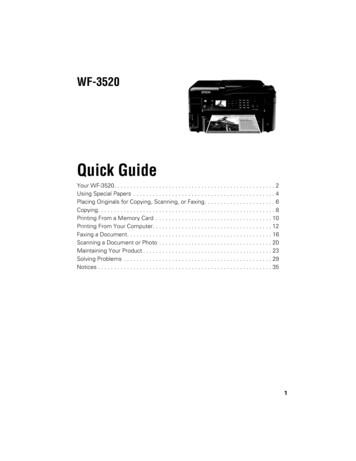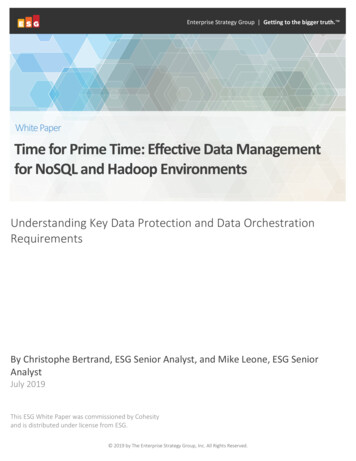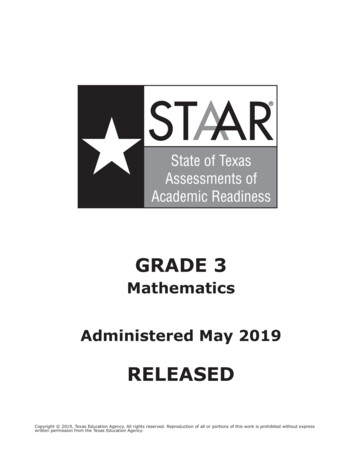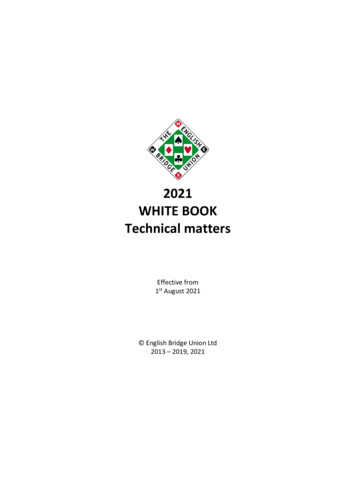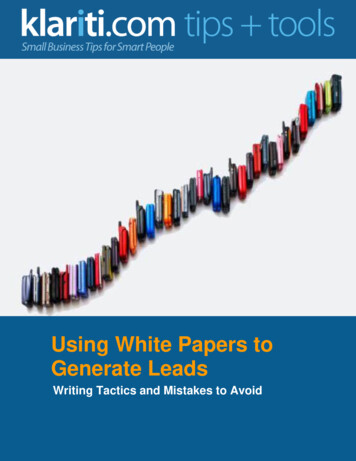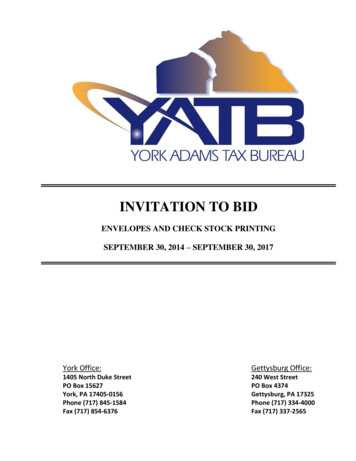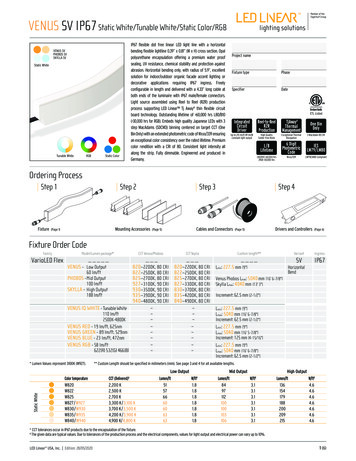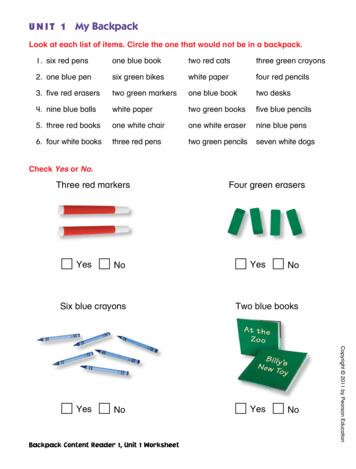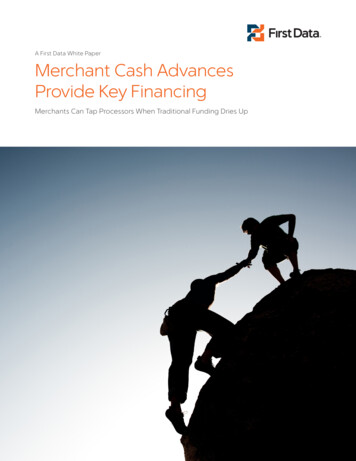
Transcription
A First Data White PaperMerchant Cash AdvancesProvide Key FinancingMerchants Can Tap Processors When Traditional Funding Dries Up
Merchant Cash Advances Provide Key FinancingA First Data White PaperIntroductionMerchants with poor credit or lack of a credit history typically have a hard time gettingfinancing through traditional means, such as a loan, line of credit, or credit card. Fortunately,merchant cash advances can help small businesses get the critical financing they need in orderto achieve goals such as building inventory or making capital improvements. The key is findingthe right provider, and the first stop should be checking to see what acceptance services areoffered by your bank, acquirer or independent service organization.To be sure, not all merchant cash advance providers are the same. Many providers havegone out of business in recent years, while other vendors have unscrupulous practices. Smallbusinesses must do their homework in order to land the right provider.The answer often is simple. Merchants can tap their own processor to provide merchant cashadvances, with compelling advantages: it’s a known relationship, and the processor’s financialstability provides funding ability. By choosing their own processor, merchants stand a betterchance of getting financing since a transaction history from credit and debit card acceptanceprobably already exists. This paper explains merchant cash advances and how they function.It also offers eight considerations when looking for a provider, and highlights the differencesbetwen loans and cash advances. The report is designed to take the mystery out of product,showing merchants an alternative way to get financing.firstdata.com 2013 First Data Corporation. All rights reserved.2
Merchant Cash Advances Provide Key FinancingMerchant Cash Advances: Convenient, Fast, EffectiveA First Data White Paper Split Funding: With split funding—or batch splitting—theRegardless of financial institution participation, there ismerchant authorizes its processor to forward the agreedstrong demand for merchant cash advances, thanks in partupon amount of the merchant’s daily settlement dollarsto the conservative lending practices that now predominate.to the provider’s account and remit the balance to theUnderwriting standards for loans have tightened considerablymerchant’s account. Split funding is the preferred structurein recent years, with traditional small-business lendingbecause it takes less time and is less risky. It offers the mostsources virtually drying up in the wake of the financial crisis.convenient option for merchants, since it makes it easierMeanwhile, regulatory scrutiny in the subprime arena hasfor the merchant to manage its payback activity.dampened enthusiasm for helping out merchants with poor credit history.Escrow Account: Daily settlement amounts are depositedby the processor and the provider debits the agreedMerchant cash advances are a viable alternative for manyupon percentage from the escrow account as anbusinesses because they provide needed capital that mayAutomated Clearing House (ACH) transaction. Thereafter,not be available through traditional channels. Cash advancesthe remaining funds are transferred to the merchant’sare not subject to lending regulations because they areaccount. This causes a delay in receipt of the funds“factoring products,” whereby a business sells a portion of its(typically a day). Additionally, the merchant has lessfuture receivables in exchange for upfront cash. In structuringcontrol over its funds, since a third party is given accessthe product as a sale of future receivables, the provider buysto all the funds to debit the amount before they arethese receivables at a discount, and gives a lump-sum cashreleased to the merchant.payment to the merchant in return. A small, fixed paymentor percentage of the merchant’s daily credit card sales is Direct Debit: The merchant cash advance company directlydebits the daily payment—based on the agreed-uponremitted to repay the cash advance.percentage—from the merchant’s bank account throughHow it All WorksACH. This also means less control to the merchant, and ACHIn a typical cash advance, merchants receive a lump-sumdebits frequently cause the merchant to overdraft.payment of one to four times their average monthly cardvolume. The provider and merchant agree on a percentageOvercoming Concernsof daily card sales or a fixed daily payment that will beMerchants must take care in their choice of a provider. Somecollected from the merchant as repayment for the advance.providers went out of business after the financial crisis a fewyears ago, when the industry went through a steep contraction.Usually, cash advance providers require merchants toMerchants must also look for a fair price. While costs to thehave a minimum monthly card volume of 5,000 a month,merchants are certainly higher than loans, the pricing of thea good standing with their landlord, and no unresolvedadvances takes into account that the provider has no collateralbankruptcies. There is minimal documentation required,or guarantees associated with the product. Merchant cashtypically consisting of processing statements, bankadvance providers hold all the risk in the event that a merchantstatements, and a copy of the property lease or mortgagegoes out of business, and the pricing must take this intostatement. Bottom line, a cash advance requires substantiallyaccount. Despite the higher cost, providers that have a strongless documentation than a loan or credit line application.history and knowledge of the merchant will support thosebusinesses that have a favorable chance of succeeding.Remittances are made in various ways, depending on theprovider. Split funding offers ease and convenience, whileClearly, merchant cash advances can provide the vital fundingescrow accounts and direct debit are more cumbersome tosmall businesses need to grow and thrive. We discuss eightadminister and give less control to the merchant. Here’s akey things to consider when comparing providers, so that youbreakdown of how the three methods work:know you are getting into the best situation.firstdata.com 2013 First Data Corporation. All rights reserved.3
Merchant Cash Advances Provide Key FinancingA First Data White PaperEight Things to Look for in a ProviderFlexible Repayment. Look for a provider that allowsAgain, choosing the right provider is critical to your strategy ofrepayment to change according to the ebb and flow ofgetting financing. With so many cash advance providers in therevenues. Repayment should be tied to the performance ofindustry, it pays to carefully scrutinize your options. Here somethe business, so if the merchant has a slow month, it paysguidelines to go by:a little less; if it has a great month, it pays more. Merchantsshould not be obligated to pay a certain fixed amount eachAn Existing Processing Relationship. Look first at themonth, regardless of business flow.capabilities of your existing processor. Your processor isalready linked to your card acceptance process and shouldProgram Length. Most common merchant cash advancehave the financial strength to take on the risk of the fundingprograms range from three to 12 months. Often providerssmall-business merchants.retain the right to collect remaining funds at the end of thatperiod, which can impair cash flow for a small business. LookMinimum Documentation. Using a provider that handlesfor a provider that does not set a time limit to the programyour merchant processing makes the whole process easier.length, but instead bases collections on processing volume.Your merchant processor holds existing processing historyThe provider should offer a wide range of programs to suitdocumentation, which helps streamline the applicationvarying merchants’ needs and markets.process considerably. In this scenario, you should typically onlyneed to provide two months of bank statements, a copy of aFinancial Strength. Choose a provider that has a long tracklease or mortgage statement, and a driver’s license.record working with merchants and knows the processingindustry, since knowledge of both is necessary for establishingFlexible, Efficient Approval Standards. A strong provideran efficient program for customers. These providers have thewill have not only solid approval standards, but also a higherfinancial wherewithal to get capital in the hands of customersapproval rate than others in the industry. A processor canquickly.offer efficiencies not found elsewhere. Small merchants, withprocessing volume ranging as low as 18,000 a year, can taptheir existing processor to get funding.Speed in Funding. Cash advance vendors report taking a fewdays to two weeks to provide funding, but often it runs onthe higher range since they may be dependent on gettingfinancing themselves through their private equity partners.Well-funded providers can supply funding in as little as threeto five days. Ask for references to help find out how long ittook to get them to get funding.Split Funding. The way providers collect funds has often beena challenge for merchants. Agents have complained thatcash advance companies have not mastered distribution andsupport of the product. Often clients are asked to set up jointaccounts or lockboxes with the provider, making the processclunky and harder to manage. Split funding, or batch splitting,takes less time and is less risky.firstdata.com 2013 First Data Corporation. All rights reserved.4
Merchant Cash Advances Provide Key FinancingA First Data White PaperHow Merchant Cash Advances Differ From LoansMerchant cash advances are classified as commercialtransactions, not loans. Here are the distinguishing No Fees. There are no late fees or penalties attached tothe product.characteristics of merchant cash advances: Fast Approval and Funding. Most cash advance No Fixed Terms. Providers estimate the term forproviders can approve and fund an application in 10repayment based on the business’ sales history. Theto 15 business days. But if you partner with a merchantcustomer is charged a set fee—referred to as a factor—processor that handles transactions, approval can comeand there are no interest charges.in three to five days. Cash Advances Are Unsecured. The provider does not Daily Repayment. This varies according to the volumerequire any collateral or guarantees, assuming all of theof the merchant, and varies according to the businessrisk of the client possibly going out of business.cycle. The provider receives a set percentage of themerchant’s daily card settlement batch. Minimum Documentation. A client can simply providetwo months of bank statements, a copy of a mortgagestatement or property lease, and a driver’s license.Conclusion: Look First at Your Processor’s CapabilitiesKeep in mind, when financial institutions take a pass onlending to you, it’s not the end of the road. It’s imperative thatmerchants team up with a reliable partner to get the financingthey need. Look first at your current processor, which shouldhave the capability to offer merchant cash advances. It’s aknown relationship, and the processor has the ability to fundthe transaction. Overall, working with your processor makesstrong business sense, giving the cash you need to help growyour business.firstdata.com 2013 First Data Corporation. All rights reserved.5
Merchant Cash Advances Provide Key FinancingA First Data White PaperThe Global Leader inElectronic CommerceAround the world every day, First Data makes payment transactions secure, fast and easy for merchants, financialinstitutions and their customers. We leverage our unparalleled product portfolio and expertise to deliver processingsolutions that drive customer revenue and profitability. Whether the payment is by debit or credit, gift card, check ormobile phone, online or at the point of sale, First Data helps you maximize value for your business.firstdata.com 2013 First Data Corporation. All rights reserved.66440 1013For more information, contact your First Data Representative or visit firstdata.com
In a typical cash advance, merchants receive a lump-sum payment of one to four times their average monthly card volume. The provider and merchant agree on a percentage of daily card sales or a fixed daily payment that will be collected from the merchant as repayment for the advance. Usually, cash advance providers require merchants to

